Bluehost vs SiteGround
We compared Bluehost vs SiteGround, to help you determine which web host is best for your needs
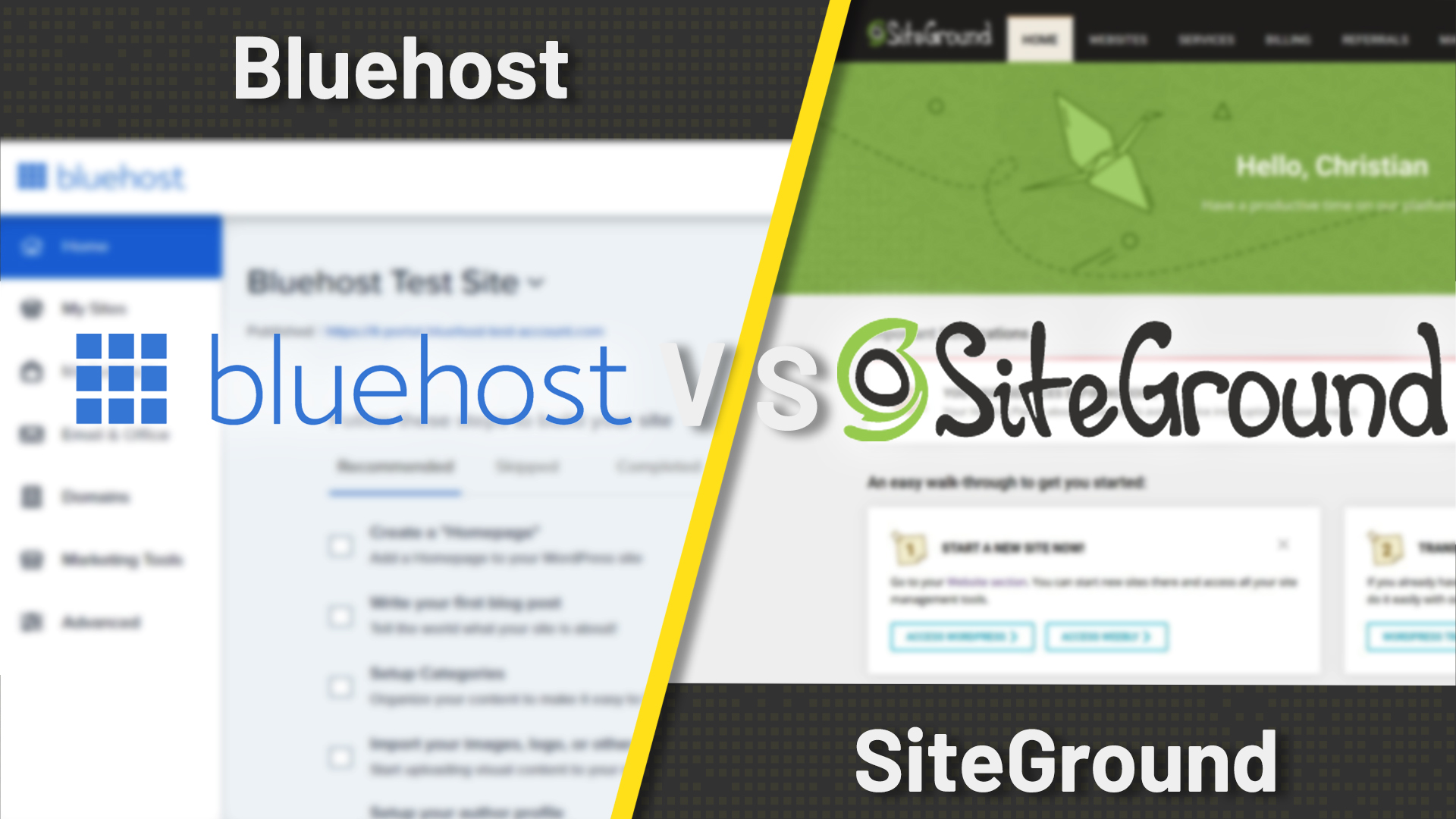

The best web hosting companies, which include Bluehost and SiteGround, deliver the tools and infrastructure you need to start building your own website. The right hosting solution is designed to store your site’s files so your content can be displayed to readers as soon as they land on your website.
In our Bluehost vs SiteGround comparison, we take a look at these industry giants to help you decide which is best for your needs. Bluehost is best known as a beginner-friendly host, while SiteGround offers slightly more advanced features for more experienced users. But neither is quite as good as its reputation would suggest, so let’s see how they compare.
- Bluehost: top features across competitive plans
Regularly ranked among the top web hosting services, Bluehost offers high-quality tools and features across a range of plans. With shared hosting starting at £2.34 a month, you can get 50GB storage and unlimited bandwidth for very little outlay. - SiteGround: easy-to-use, featured-packed hosting
SiteGround's advanced web hosting, packed with excellent features, offers value-for-money and tool-stuffed packages for users. It's also easy to use, with guided site setups, a native management dashboard, and simple navigation.
Bluehost vs SiteGround: What we compared
- User interface and setup
- Pricing
- Server resources
- Security features
- WordPress setup
- Customer service
- Domain registration and management
- Which host is best for me?
- What our reviewers said
- Alternatives to Bluehost and SiteGround
User interface and setup
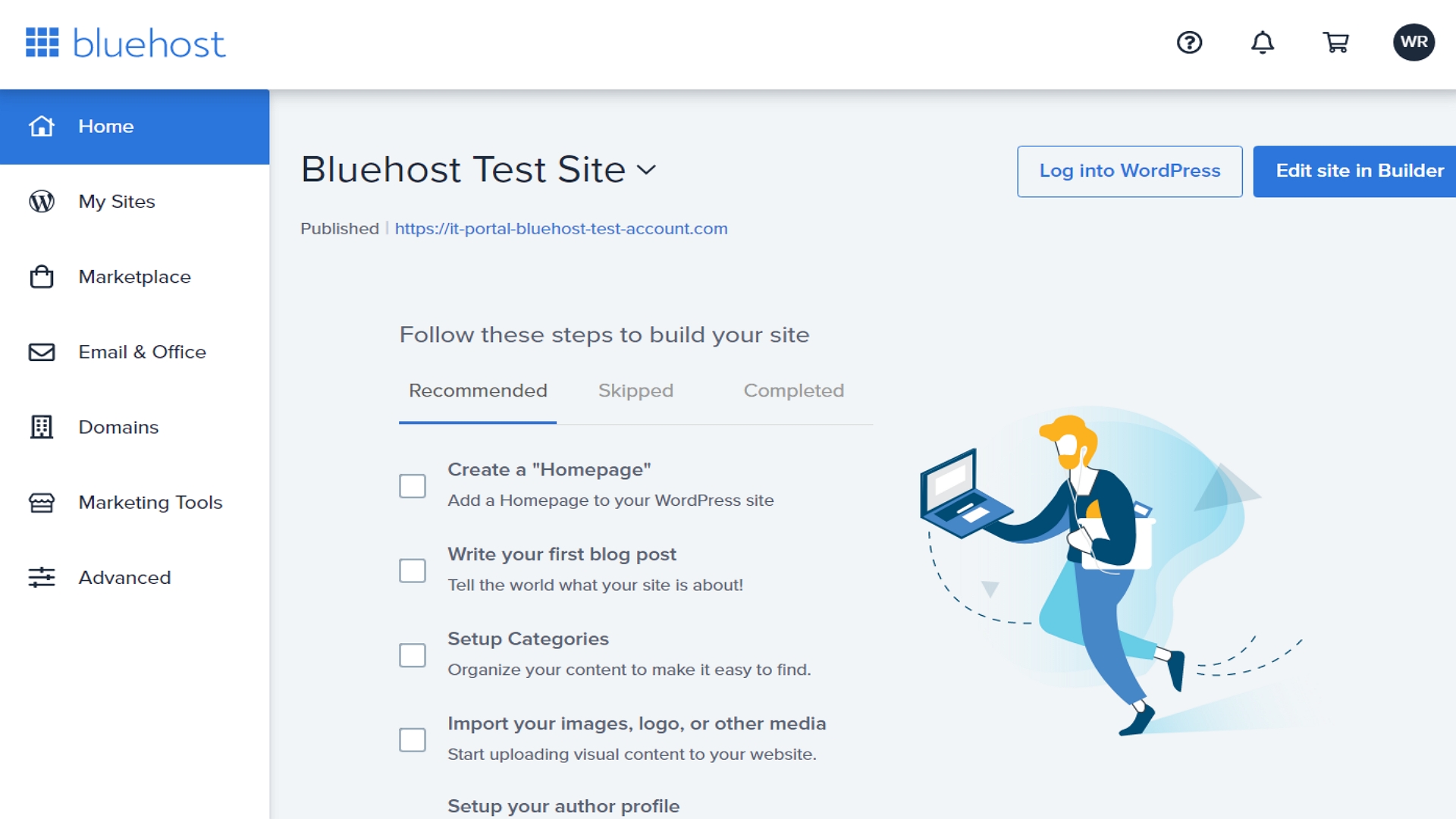
Bluehost is known as a beginner-friendly hosting provider, and its user interface is consistent with this. Its native management dashboard is very tidy and easy to navigate. There are tools for your hosting account, emails, domains, and more.
In addition, Bluehost uses a generic cPanel control panel for more advanced management. cPanel is usually very straightforward, but we found the Bluehost version a little clunky. Setting up a new website is super easy, though, and all you need to do is follow the prompts from the main dashboard.
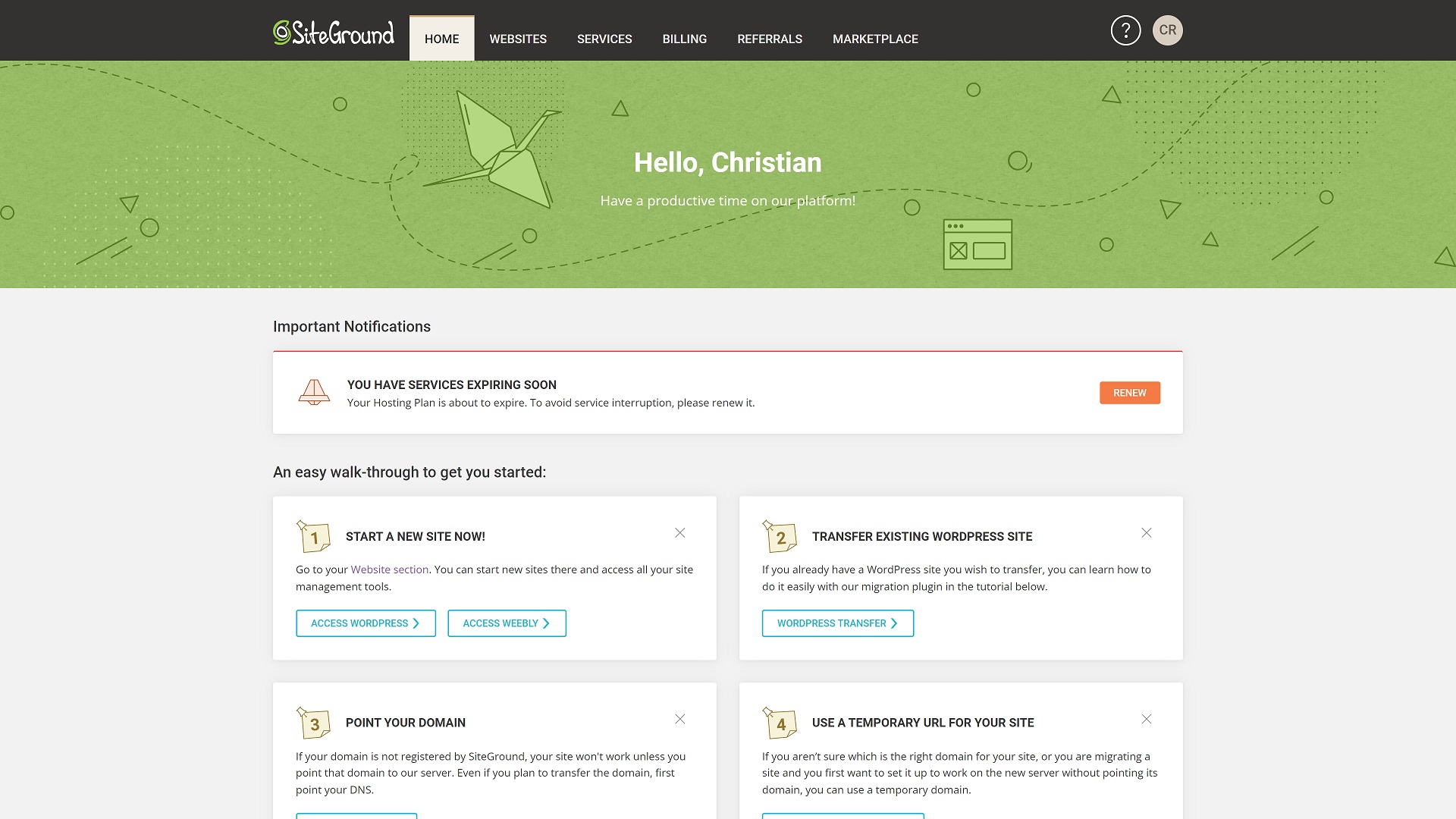
Despite the huge range of advanced tools and features on offer, SiteGround is similarly easy to use. Its native dashboard is excellent, with the perfect mix of tips for beginners and easy access to more powerful tools.
Unlike Bluehost, SiteGround uses its own native control panel that’s designed similarly to its main management dashboard. Its range of tools are cleverly laid out. On top of this, SiteGround also makes it very easy to create a new site, with prompts and guidance on par with Bluehost’s.
Pricing
Bluehost and SiteGround both offer a versatile range of hosting options. The former has four shared hosting plans, which range from £2.34 to £11.08 a month for an initial annual subscription, or £3.93 to £11.08 a month for an initial three-year subscription. Unmanaged WordPress hosting has similar pricing. Month-to-month payments aren’t available.
Get the ITPro daily newsletter
Sign up today and you will receive a free copy of our Future Focus 2025 report - the leading guidance on AI, cybersecurity and other IT challenges as per 700+ senior executives
Bluehost also offers managed WordPress hosting from £15.42 a month with a 36-month subscription, VPS hosting from £15.08 a month, and dedicated servers from £63.52 a month. VPS and dedicated server plans each require 36-month subscriptions.
SiteGround is more expensive, but you get what you pay for. Its three shared plans range from £2.99 to £7.49 a month for an initial annual subscription, but this increases to £11.99 to £29.99 a month on renewal. Month-to-month payments will set you back further.
On top of this, SiteGround has managed WordPress hosting for the same prices, and powerful cloud hosting options that start at £60 a month. It lacks dedicated server and VPS hosting, but its versatile cloud plans more than make up for this.
Bluehost vs SiteGround: pricing plans compared
| Header Cell - Column 0 | Bluehost | SiteGround |
|---|---|---|
| Free version? | ✖ | ✖ |
| Starts at | £2.34 a month | £2.99 a month |
| Small business | £4.33 a month | £4.99 a month |
| Medium business | £4.33 a month | £7.49 a month |
| Professional | £11.08 a month | N/A |
| WordPress (managed) | From £15.42 a month | From £2.99 a month |
| Cloud hosting | N/A | From £60 a month |
All prices listed, with the exception of the WordPress and cloud prices, are for the initial one-year term
Server resources
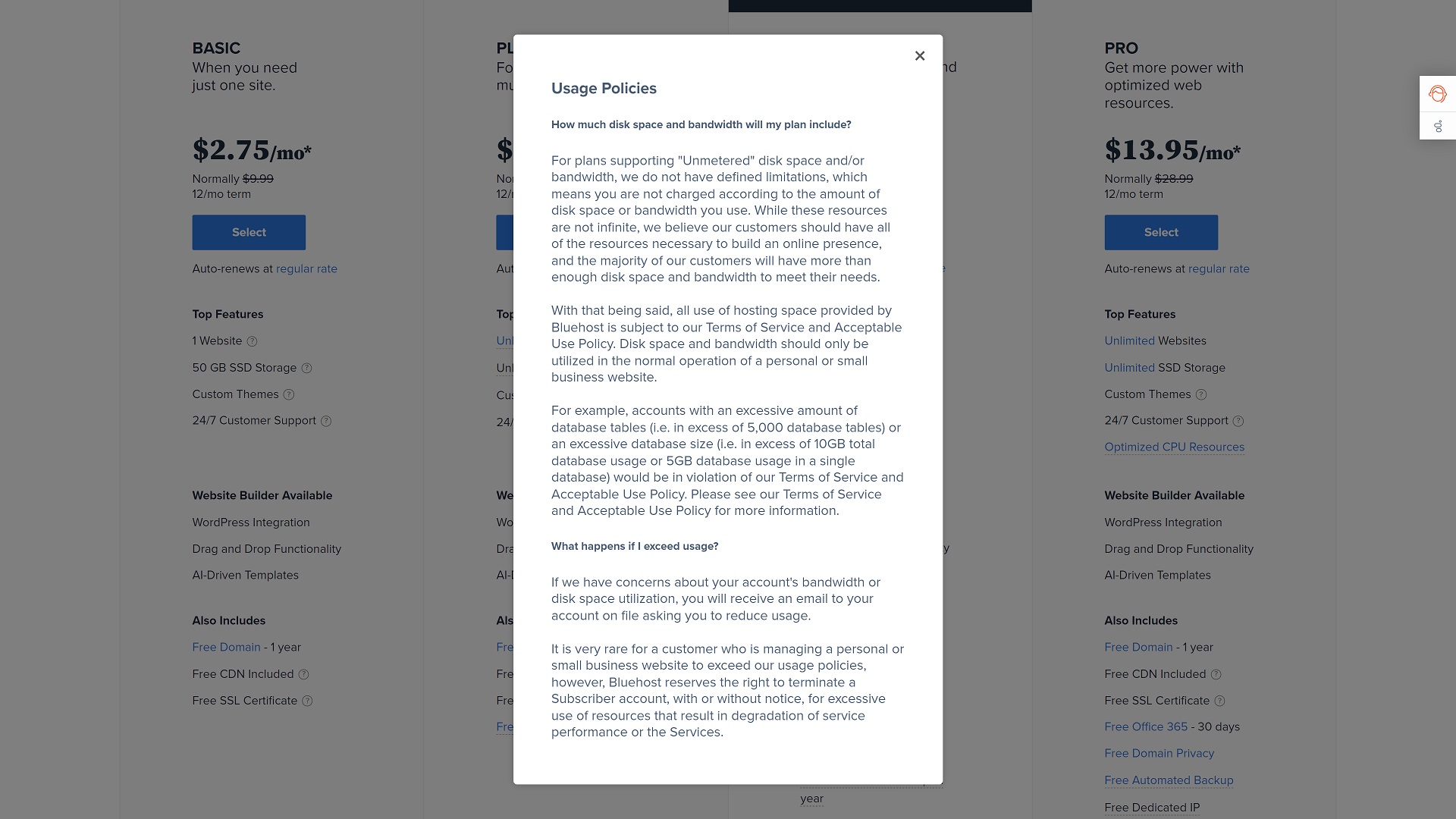
Some hosts offer unlimited storage and bandwidth with their shared hosting plans, while others restrict the number of resources you can utilise.
Bluehost sits in the first category, as all but its cheapest shared hosting plan come with unlimited SSD storage and bandwidth. The cheapest plan still comes with unmetered bandwidth, along with a generous 50GB of storage—more than enough for a simple website.
However, a closer look at Bluehost’s terms of use reveals that its unlimited plans are only unlimited until you use too many resources. If your site gets too big, you will be asked to upgrade to a more expensive plan.
Like Bluehost, SiteGround offers unmetered bandwidth with all three of its plans. However, you will be constrained by 10GB, 20GB, or 40GB of storage, depending on which subscription you go for. Considering SiteGround’s high prices, we would have liked to see a little more generosity here.
Security features
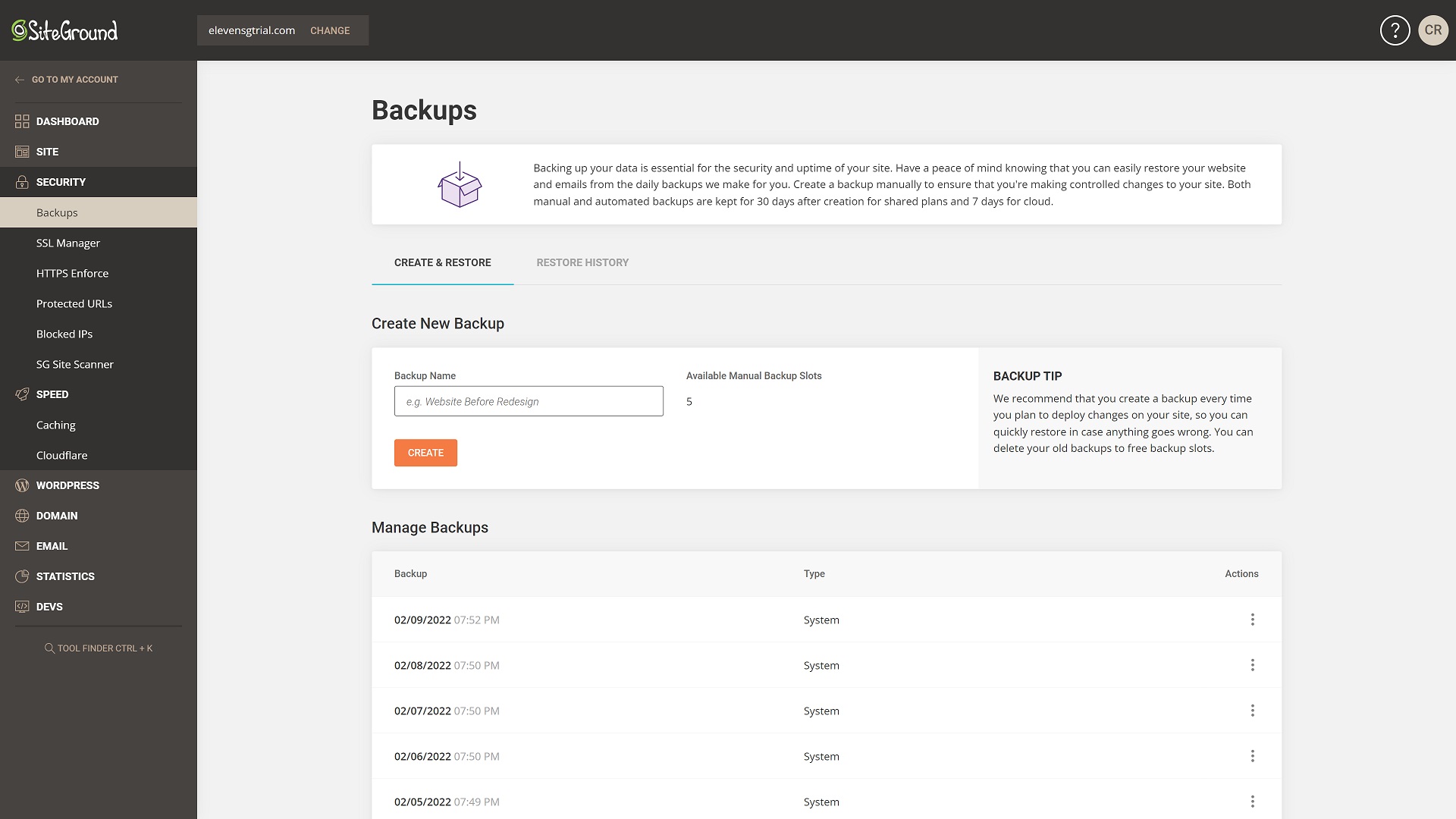
SiteGround performs admirably on the security front, with excellent built-in protection for sites of all sizes. All plans come with proactive updates and patches, real-time monitoring and threat identification, and malware scanning.
On top of this, there’s a neat spam protection tool to help filter unwanted emails. Automatic daily backups come with all plans, and more advanced on-demand backups are available with select subscriptions.
With Bluehost, you will benefit from a free SSL certificate and very simple server monitoring, but there aren’t many other native tools to speak of. DDoS protection can be added for free through Cloudflare. Bluehost also offers a number of premium security tools, including automatic backups, advanced server monitoring, and malware detection and removal.
But these premium add-ons can get quite expensive, and they are all required if you want your site to be secure. Because of this, SiteGround clearly comes out ahead.
WordPress setup
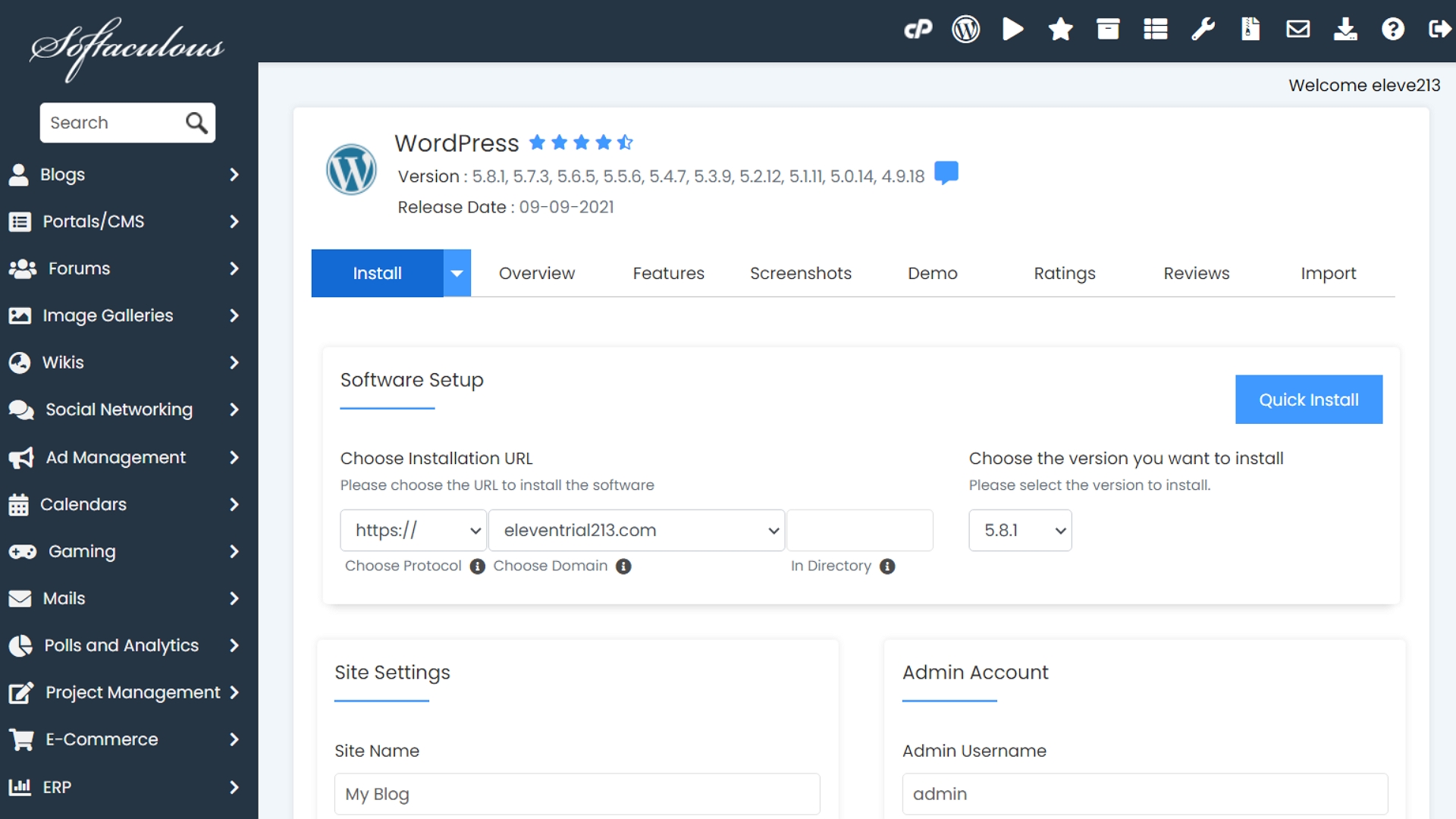
Bluehost makes it extremely easy to set up a new WordPress website. New users will be guided through a short questionnaire that asks about your experience, and Bluehost will deliver tips and support-based content based on your answers.
To start a new website, you can either use the Bluehost WordPress website builder, or install WordPress directly with the Softaculous one-click installer. We tested both options, and had a new website online within a few minutes with each method. In saying that, the website builder is definitely a better option for those who want to get a site online fast, while we’d recommend using Softaculous if you want to use the WordPress editor.
Starting a WordPress site with SiteGround is just as easy. When you log into your account, you will see prompts directing you to start a new site. Simply follow these, and you will be online in no time at all. However, SiteGround has no website builder, so you will have to use the native WordPress editor or a third-party plugin.
Customer service
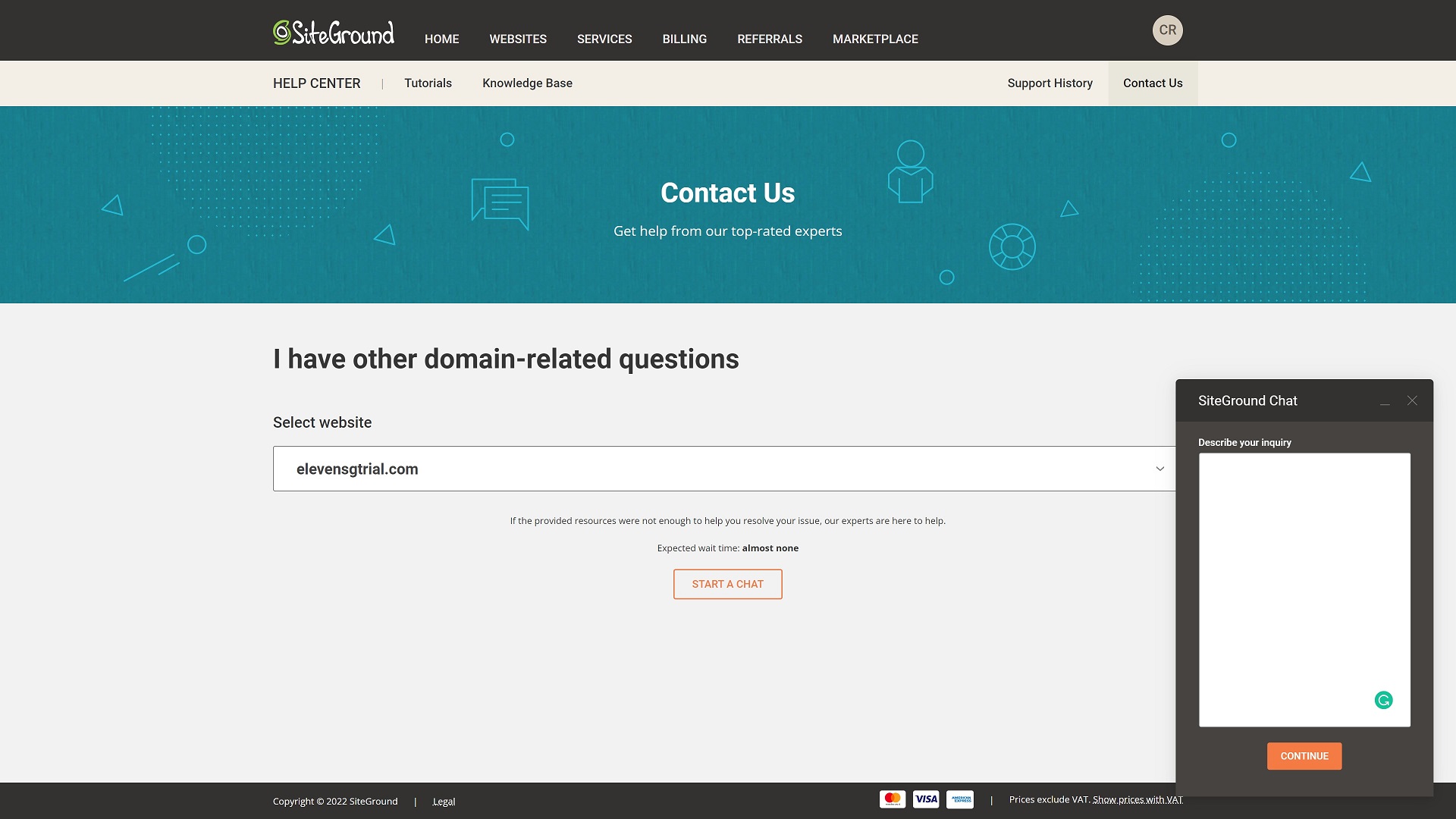
Good customer service is an important consideration when selecting a web host. If you run into technical difficulties or other issues when you’re setting up your website, you will want to be able to get help in a timely manner.
Bluehost’s support is decent. It offers 24/7 phone and live chat channels, but email and ticketing are notably absent. The customer service team can also be a little slow to reply, and the support agents aren’t the most knowledgeable we’ve seen.
On the other hand, SiteGround openly advertises the fact that it focuses on customer service. It offers 24/7 phone, live chat, and email ticket support, and the team is super-knowledgeable. You will usually be connected with an agent within minutes, and we’ve never had trouble getting our questions answered.
Domain registration and management
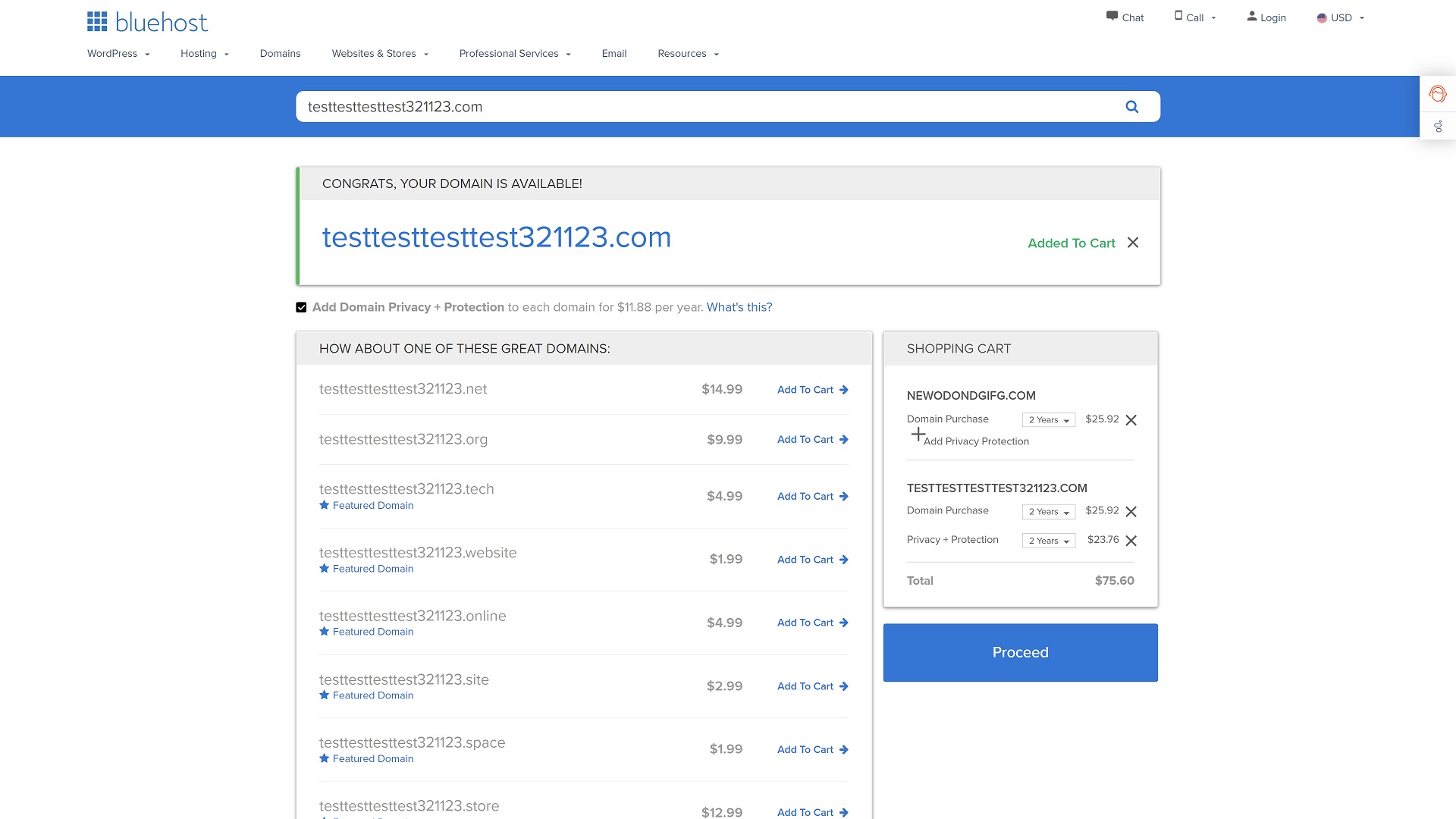
Bluehost and SiteGround both have domain registration and management portals, but both are average at best.
Bluehost, for example, advertises a range of low-cost domains. However, a closer look reveals that the advertised prices are only for the first year, and they increase significantly on renewal. You will have to pay a £1.25 a month domain privacy fee, something most registrars include for free.
SiteGround doesn’t advertise low initial prices. Its domain registrations are among the most expensive we’ve seen, and it charges £12 a year for domain privacy protection.
Regardless of which host you use, we’d suggest registering your domain elsewhere for more flexibility and much lower prices.
Which web host is best for me?
Bluehost has long been a popular host, but a closer look at its services reveals that it’s not nearly as good as it appears. SiteGround is an excellent choice that you can trust to deliver, but it’s quite expensive compared to many other options.
SiteGround is very user-friendly, and it comes with a suite of advanced tools. Its security integrations are great, its customer service team knows its stuff, and starting a new website is a straightforward process.
Bluehost is also quite easy to use, and its unlimited bandwidth and storage are attractive. But its deceptive price structure, lack of security tools, and poor customer service really turn us off.
The bottom line: If you can afford SiteGround’s high prices, you will find it to be one of the best hosts around for small business websites or online stores. Bluehost could be considered if you want to create a personal site or blog, but there are better options on the market.
Bluehost vs SiteGround, compared
| Header Cell - Column 0 | Bluehost | SiteGround |
|---|---|---|
| UI and setup | Intuitive and beginner-friendly | User-friendly native UI |
| Pricing | Cheap but deceptive | Expensive but great value for money |
| Server resources | “Unlimited everything” | A little restricted |
| Security features | Well below standard | Excellent across the board |
| WordPress setup | Simple and intuitive | Simple and intuitive |
| Customer service | Could be better | Friendly and knowledgeable |
| Domain registration and management | Expensive | Expensive |
What our reviewers said
Bluehost
“At the end of the day, Bluehost is an okay option for beginners looking for a basic host. If you can look past the terrible performance and somewhat limited features, you will find a beginner-friendly interface and a streamlined site-creation experience. But if you want something even slightly advanced, look elsewhere.”
- Score: 3.5/5
SiteGround
“SiteGround is a highly rated web hosting provider, and it’s easy to see why … we’d suggest considering SiteGround if you’re looking for a high-end hosting provider that focuses on delivering advanced solutions rather than the lowest prices. If you need a budget option, look elsewhere.”
- Score: 4/5
Alternatives to Bluehost and SiteGround
Bluehost will be a little basic for many users, and SiteGround’s high prices will be restrictive for some. Luckily, there are plenty of other great options to choose from.
One of our favorites is Hostinger, which offers advanced hosting solutions at very competitive prices. It’s known for its excellent security tools and beginner-friendly hPanel control panel, and there are loads of extras like a free domain and unlimited bandwidth.
Another great budget choice is Namecheap, which is the only provider that compares with Hostinger in terms of prices. It’s better known for its leading domain registration services, but it’s still a host worth considering if you don’t need anything too fancy.
Hostwinds, on the other hand, is a great alternative for those willing to pay a little more for advanced service. It boasts some of the best performance we’ve seen, and all plans are backed by a load of great business and management tools.
Further reading on web hosting
To find out more about the best alternatives to Bluehost and SiteGround, check out our guides to the best unlimited web hosting, and the best VPS hosting. If you’re still unclear about why you need hosting, you can find out more in our article asking what is web hosting?
. Finally, if you've got a WordPress website or are looking to create one with one of the best WordPress website builders, the best WordPress hosting is ideal and is provided by many of the best web hosts.
Daniel is a freelance technology and finance writer, whose scientific background in the natural sciences lends rigour and nuance to his informative, accessible articles. His reviews on website builders, web hosting and business web development grace the virtual pages of TechRadar Pro, WebsiteHostingRating.com, and HostingReview.com, as well as IT Pro Portal. Well-versed in blockchain, cloud computing and cybersecurity, Daniel takes a keen interest in all aspects of B2B and B2C tech.
-
 Businesses are taking their eye off the ball with vulnerability patching
Businesses are taking their eye off the ball with vulnerability patchingNews Security leaders are overconfident in their organization’s security posture while allowing vulnerability patching to fall by the wayside.
By Jane McCallion Published
-
 Global cybersecurity spending is set to rise 12% in 2025 – here are the industries ramping up investment
Global cybersecurity spending is set to rise 12% in 2025 – here are the industries ramping up investmentNews Global cybersecurity spending is expected to surge this year, fueled by escalating state-sponsored threats and the rise of generative AI, according to new analysis from IDC.
By Ross Kelly Published